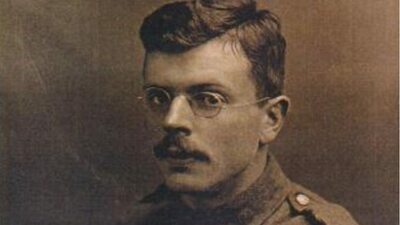 On Thursday evening (7th March) The Gesualdo Six will give the world premiere at Cadogan Hall of The Wind's Warning, my setting of the poem The Wind by Ivor Gurney. Gurney is still relatively unknown so I thought I would say a little about him. Ivor Bertie Gurney (28 August 1890 – 26 December 1937) was an English poet and composer, particularly of songs. Born in Gloucester he sang as a chorister at Gloucester Cathedral from 1900 to 1906 then won a scholarship to the Royal College of Music to study with Stanford who allegedly said he was "unteachable". Gurney suffered his first breakdown in 1913. Enlisted as a private soldier in the Gloucestershire Regiment, he began writing poetry. He was wounded in the shoulder in April 1917 then gassed in September the same year. In March 1918, Gurney suffered a serious breakdown, writing several songs whilst hospitalised despite the piano sounding, he said, like "a boiler factory in full swing because of the stone walls". He subsequently received an unconventional diagnosis of nervous breakdown from "deferred" shell shock. Gurney was regarded as one of the most promising men of his generation, publishing his second volume of poetry, War's Embers, in May 1919 to mixed reviews. He wrote many songs, instrumental pieces, chamber music and two works for orchestra, War Elegy (1920) and A Gloucestershire Rhapsody (1919–21). Sadly in 1922, his mental health caused him to be declared insane and Gurney spent the last 15 years of his life in psychiatric hospitals where he wrote both literary works and music. Much of his musical output remains unpublished and unrecorded. The Wind's Warning is a setting of what is believed to be his last poem. According to the editor of the collection in which the poem appears, it was written on the back of an Oxford University Press letterhead dated 6 March 1929 and signed 'Valentine Fane' by Gurney. (He frequently used different names on his later manuscripts.) The poem is a bleak reflection on the passing of time and lost opportunities. Musically the piece uses vocalisations to create the sound of the wind against which are set gently dissonant clusters. Melodic motifs drift in and out until the middle section, "At dawn a thin rain wept" which becomes more lyrical and tonal. The piece finishes with a return to the opening soundscape. I am delighted that The Gesualdo Six are performing this piece and very much look forward to hearing it! Tickets available https://cadoganhall.com/whats-on/choral-2018-19the-gesualdo-six/ Score coming soon at https://composersedition.com/composers/alisonwillis
0 Comments
Leave a Reply. |
Details
AuthorAlison Willis is a composer and musician based in the East of England. Archives
September 2023
Categories |
 RSS Feed
RSS Feed